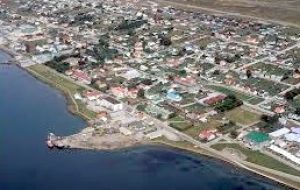MercoPress. South Atlantic News Agency
Falklands' population, 2.844, according to preliminary data from this year's census
 The total population for Stanley is 2,480 and for Camp is 364, with 184 living on the East, 141 on the West and 39 individuals living on the smaller islands.
The total population for Stanley is 2,480 and for Camp is 364, with 184 living on the East, 141 on the West and 39 individuals living on the smaller islands. Preliminary data from the Falkland Islands 2016 census indicates that the usually resident population is 3,248 (2,844 excluding Mount Pleasant Complex), while the total population for Stanley is 2,480 and for Camp is 364, with 184 living on the East, 141 on the West and 39 individuals living on the smaller islands.
However the results advanced by the Falklands' government in a Friday release indicate that the overall population levels has increased in both Stanley and Camp, but at the same time it is important to note that these figures may change as the data is reviewed. More detailed analyses will be made available when the full Census reports are published early in the New Year.
The release points out that the 9th of October marked the 2016 Falkland Islands Census and in total, 1,584 returns were received and processed. The 2016 Census was the second time an online Census platform was available for people to complete their returns and excluding forms received from civilian contractors at MPC, 48% of returns were completed online. Work is ongoing to error-check and validate the data received, however provisional data on high level results is now available.
To that effect on Census night, 3,181 people were present on the Islands. Included in that figure are 404 civilian contractors based at MPC, 112 visitors to the Islands, and 52 individuals on marine vessels in Falkland waters. Thus, excluding MPC, the total number of usually resident individuals present on Census night was 2,613.
Not including temporary visitors, 2,300 people were present in Stanley and 313 in Camp. The Camp figure breaks down to 170 in East Falkland, 106 in West Falkland, and 37 on surrounding islands.
As to the population usually resident on the Falklands refer to individuals that normally live on the Islands, but who were off the Islands on Census night. In addition, temporary visitors are not included in the counts. Work on the total population data for the Islands is continuing, however preliminary data indicates that the usually resident population is 3,248 (2,844 excluding MPC). The total population for Stanley is 2,480 and for Camp is 364, with 184 living on the East, 141 on the West and 39 individuals living on the smaller islands.
These results indicate that the overall population levels has increased in both Stanley and Camp, however it is important to note that these figures may change as the data is reviewed. More detailed analyses will be made available when the full Census reports are published early in the New Year, concludes the release.




Top Comments
Disclaimer & comment rules-

-

-

Read all commentsAnother Argentine view is that the population of the Falklands is too small for self government. Just as international law does not require a state’s territory to be a minimum size, nor is there a minimum population requirement. Infinitesimal smallness has never been a reason to deny self-determination to a population (‘The Right to Self-Determination in Very Small Places.’ Franck T.M. and Hoffman P.L. 1976, P331) .
Dec 24th, 2016 - 07:58 pm +5Good news.
Dec 24th, 2016 - 08:50 pm +2Bob
Dec 25th, 2016 - 12:43 pm +2“Another Argentine view is that the population of the Falklands is too small for self government”
The problem is, from their point of view, their pronouncements are never a blow to the Islanders and you would think they would try to minutely examine history to evidence their claim or come up with an overwhelmingly convincing argument for that claim.
It's like their proximity theory, at once it can be countered by other territories near to the coast of larger ones that, do not become the property of those larger territories.
I hope the British government take note of the work of Roger Lorton. Terence Hill and yourself, which provide reasons why the Argentine arguments for sovereignty over the Falkland Islands are so poorly researched, pathetic and doomed to failure.
Commenting for this story is now closed.
If you have a Facebook account, become a fan and comment on our Facebook Page!